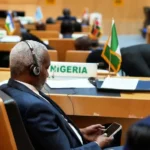By Martha Agas, News Agency of Nigeria (NAN)
Access to girl-child education remains a persistent challenge in Nigeria, especially in the northern region.
Stakeholders attribute this to the patriarchal system, which places greater value on educating boys over girls.
According to a UNICEF report on the state of Nigeria’s children, 10.2 million primary school-aged children and 8.1 million secondary school-aged children are out of school in the country.
Of this number, the Malala Fund estimates that more than five million are girls, with the north contributing the majority.
Reports show that the highest numbers of out-of-school girls are in the North-East and North-West regions, where they face multiple barriers such as child marriage, poverty, gender-based violence, and insecurity.
States in the North-East and North-West have female primary net attendance rates of 47.7 per cent and 47.3 per cent, respectively, meaning that more than half of the girls are not in school.
Sadly, analysts note these challenges are further compounded by low levels of investment in education, inadequate school infrastructure, cultural norms, a shortage of teachers and practices that discourage attendance in formal education, especially for girls.
While these challenges have been the focus of various interventions, experts argue that data from the past five years shows no visible improvement in access to girl-child education across the country.
Reports indicate that between 2020 and 2025, Northern Nigeria consistently recorded between five and seven million out-of-school girls, with only minor fluctuations despite ongoing efforts.
To foster meaningful progress in the region, stakeholders note that alongside a locally tailored, multi-faceted strategy, deliberate efforts must be made to engage men as active allies to champion girls’ education.
They say to strengthen efforts, it is imperative to engage men who hold key roles in families, communities, and governance as active supporters and advocates.
Also, education experts observe that in many northern communities, men, especially fathers, brothers, and other male relatives play a key role in deciding whether girls attend or remain in school.
As such, securing their support is crucial to reducing dropout rates and delaying early marriage.
Mrs Keturah Shammah, Executive Director of Girls Education Mission (GEM) International, affirmed that men’s influence within families, religious spaces, and policy circles can either open doors or close them for the girl child.
According to Shammah, male leaders shape policies as most political, religious, and traditional leaders are men, and they have the authority to enact and implement pro-girl policies, mobilise community resources for schools and champion girls’ education from the pulpit and the palace.
Their support, she says, can help reinterpret cultural norms that restrict girls’ education and promote inclusive practices.
Other analysts strongly agree that fathers play a crucial role in promoting girls’ education.
They say, those who value and support their daughters’ schooling can inspire other families, while personal testimonies from such fathers can help shift attitudes in communities that are resistant to change.
An advocate of girls’ education based in Bauchi State, Seun Onarinde, noted that in the North, men are the breadwinners in over 70 per cent of households.
They serve as religious leaders in most mosques, and as community heads whose words often resolve disputes and shape direction.
“So, when a father says, ‘My daughter must go to school’, it carries weight. When an Imam preaches that girls’ education is not against Islam, people listen.
“When a husband supports his wife’s dreams, the whole community begins to rethink its limits on women.
“We need more men to champion this movement, and when strong and influential men speak up not just in policy rooms but in their homes and streets, change happens faster,” he said.
Similarly, Benjamin John, an advocate based in Borno, supported this view.
He said men are the custodians of culture, religion, and the economic foundation of most households.
“If men decide that girls in the family will not go to school, that decision often stands,” he said.
John explained that men may tell their wives that educating a girl adds no value, and in some cases, the wives might agree.
As a result, these girls are sometimes made to hawk to bring in additional income for the family.
“But if men in rural areas are actively involved in ensuring that girls have access to education, it will lead to meaningful outcomes in those communities,” he said.
According to him, culture, religion, and poverty are three key factors where men wield significant influence.
To further drive access, gender advocates note that men can play key roles in creating safer environments by standing against gender-based violence in schools and along the routes girls take to and from school.
Other stakeholders say men can serve as role models for boys by shaping their attitudes to recognise that girls deserve the equal respect and opportunities to attend school.
This, they say, is key to raising a generation that values education for all.
In this light, Ziauddin Yousafzai, Co-founder of the Malala Fund, recently visited Nigeria to engage with traditional and religious leaders, local partners, and civil society advocates on advancing girls’ education.
The fund was co-founded in 2013 by Malala and her father Ziauddin Yousafzai.
It is rooted in Malala’s personal journey from a small town in Pakistan’s Swat Valley, where she survived a Taliban assassination attempt in 2012 for advocating girls’ education, to becoming a global advocate for girls’ education.
Today, the fund leads global advocacy for 12 years of free, safe, and quality education for every girl.
His visit underscored the need for coordinated action to tackle the barriers keeping girls out of school.
It focused on a critical theme: how to mobilise everyone, especially men and boys to stand with girls and defend their right to learn.
To build partnerships for change, he held a roundtable discussion with more than 40 faith leaders, traditional rulers, civil society advocates, and education stakeholders.
The dialogue focused on how men and boys can use their influence to challenge gender inequality, support girls’ education, and help end child marriage.
Among the participants were Rev. John Hayab, Chairman of the Christian Association of Nigeria (Northern States), and Hajiya Amina Haruna, Director at the Federal Ministry of Education.
She is also the National Coordinator of the Adolescent Girls Initiative for Learning and Empowerment (AGILE) project.
Yousafzai also visited Sokoto State, which has one of the highest rates of child marriage and out-of-school girls in Nigeria.
There, he met with the Sultan of Sokoto, Alhaji Muhammadu Sa’ad Abubakar, who affirmed his readiness to collaborate through his Foundation for Peace and Development, to support girls’ education.
While these strategic meetings are expected to yield positive outcomes, Malala Fund Fellows in Nigeria have already begun to share stories of how male engagement has made a difference in promoting girls’ education.
One beneficiary of such efforts is Halima Yusuf, a law graduate from Bayero University, Kano, and an alumna of the Malala Fund Girl Fellowship Programme.
She says, “For my dad and my brother Kabir, I will always be grateful for how they continue to believe in me and support my decisions.
“From encouraging my unexpected choice to study law, to guiding me through leadership roles in school,” she said.
Yusuf says, they continue to be shining examples of generosity and selflessness, values that have shaped how she sees the world and inspired her to give back.
For Aishatu Kabu in Borno, the decision to establish the Zenith of the Girl Child and Women Initiative Support was inspired by her personal experience and difficulties in accessing education in the state.
She actively works with male advocates, recognising their importance in influencing change, a strategy she says is already yielding results.
While stakeholders are hopeful of achieving this feat by securing the support of men and accelerating progress in girls’ education, analysts insist that meeting SDG 4 and 5 targets for girls by 2030 will require more than expanded access to free, quality education.
They emphasise the need to also tackle the deep-rooted gender inequalities outlined in SDG 5 such as child marriage, gender-based violence, and discriminatory cultural norms that continue to hinder girls’ learning.
In conclusion, experts opined that empowering girls through education and removing systemic barriers to equality are essential for achieving sustainable development.(NANFeatures)
***If used, please credit the writer and the News Agency of Nigeria.












